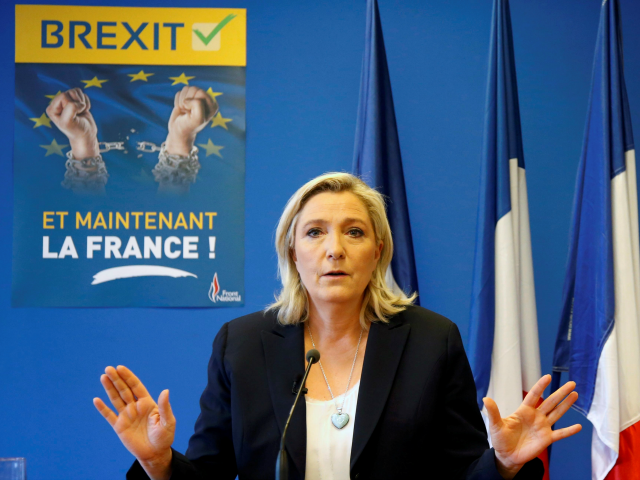The EU project is failing. Brexit is the symptom rather than the cause, and the UK is the first domino which could topple the entire political project of a United States of Europe.
Euroscepticism is on the rise in rest of Europe too, and the unelected EU Commissioners should be very worried.
The problem for the EU is these issues are not easily solved. Euroscepticism is caused by different EU policies and there is no magic bullet to cure it.
Marine Le Pen, the leader of the French National Front, is on the march. She is an elected MEP who led her party to victory in the 2014 European Parliament elections with almost 25% of the vote. Even more worryingly forthe European Union, it’s likely she will gain enough votes to be included in the French Presidential run-off. It is possible she could be the French President next year.
Le Pen’s flagship policy is a French in-out referendum in which she will campaign to ‘Leave’ the EU. The overwhelming concern in France is immigration, caused by the EU’s borderless Schengen Area and freedom of movement – and the opinion polls are telling.
Over 60% of French people view the EU negatively and ‘Leave’ trails ‘Remain’ by only around 12%.
In the Netherlands, Geert Wilders from the populist-right Freedom Party is calling for an EU referendum. His party is currently ahead in the opinion polls on 22%, but is likely to be kept out of any future coalition by mainstream parties who refuse to work with him.
As with France, in the Netherlands immigration is the contentious EU issue. They have a history of Euroscepticism too, famously voting against the EU’s Constitutional Treaty and recently against the EU’s deal with Ukraine.
It is also important to remember, the Netherlands has close trading links with the UK, favouring a free trade approach. If the EU attempts to roll back on any free trade approach once the UK leaves the bloc and erects barriers against UK trade, they will make so-called ‘Nexit’ far more likely.
One of the EU’s most disastrous policies has been the Euro currency. We are therefore obliged to mention Greece. In 2016 over 61% of Greek voters rejected the bailout package they were offered, but it was forced on them anyway.
Membership of the Euro allowed Greece to borrow money too cheaply creating a bubble fuelled by mass debt, without a central bank to facilitate a competitive devolution. The Greek economy collapsed, condemning future generations to poverty. Greece is only a charismatic Eurosceptic leader away from an EU exit.
Germany is often considered one of the most pro-EU countries, however Euroscepticism is even on the rise here. Next year Germany’s Eurosceptic AfD Party are almost certain to have seats in the German Parliament after defeating Merkel’s party in recent regional elections.
The continual Greek bailouts and the weakness of the Schengen Area are causing tension. However, a vote to leave could only occur if Germany’s contributions to the EU and its currency become unsustainable, combined with its influence being steadily diminished.
Denmark is another country with a growing Eurosceptic party. The right-wing Danish People’s Party, and even left-wing parties are calling for a referendum. EU support is still strong and increasing in the wake of Brexit. However, 40% want a referendum, and if Britain makes a success of it then Danish opinion may change.
Finish Eurosceptics forced a debate in Parliament about leaving the Euro currency after receiving over 50,000 signatures. The Eurosceptic Finns Party is a member of the coalition government after coming second in the 2015 election.
Whereas the Finns Party is Eurosceptic, it does not advocate EU withdrawal. Instead, it argues for renegotiation and a referendum. Their view in an EU referendum is likely to depend on how Britain fares and the amount of immigration reform on offer, as this is their number one issue.
The Swedish Democrats are calling for Sweden to exit the EU and the Left Party are also calling for a referendum. They have 49 seats in the Swedish Parliament and echo the concerns of the Swedish people over immigration. Fortunately, Sweden did not adopt the Euro after rejecting it in a referendum.
Sweden has strong trading links with the UK and any future Swedish referendum is likely to depend on whether the UK makes Brexit work.
A Spanish exit is highly unlikely, but a Catalonia one is not. Independence for Catalonia is a very popular view, with separatists in charge of the regional government. They are wealthy enough to go it alone and had a referendum in 2014 where over 80% voted for independence, a result which is not recognised by Spain. If the Catalans declare independence from Spain, they would be forced under EU rules to leave the EU too.
Hungary has deep anti-immigration sentiment, with nearly 98% of those taking part in its recent referendum voting against the EU’s migrant quotas. The referendum was not valid due to turnout, but this has sent a strong message to Brussels. This, however, is more of an attempt to increase influence within the EU, rather than signalling a willingness to leave.
The Eurozone’s problems and immigration dominate the Italian news agenda. The Five Star Movement want to leave the Euro and reject the EU’s increasing influence in Italy’s affairs. They are currently leading the opinion polls and will be a major player in any future Italian election. 44% of Italians want an EU referendum. Further Eurozone problems could also pave the way for their exit.
Euroscepticism is here to stay. The EU must change or collapse. We at Get Britain Out are positive the EU is incapable of change, and therefore collapse is inevitable.
Matthew Ellery is a Research Executive at Get Britain Out

COMMENTS
Please let us know if you're having issues with commenting.